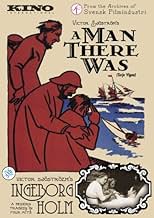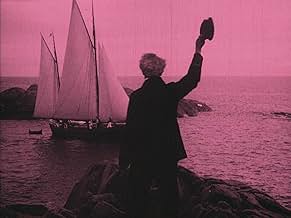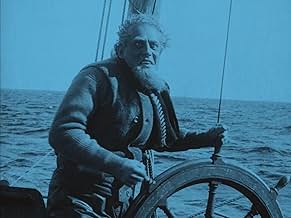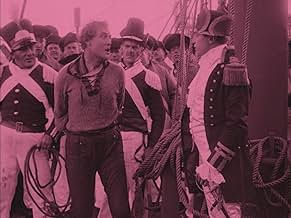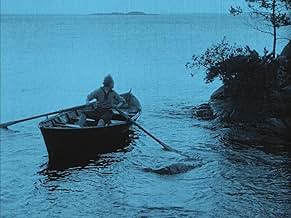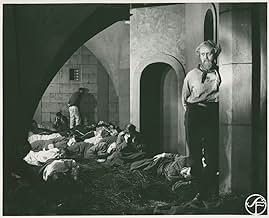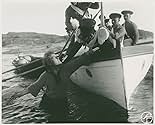Aggiungi una trama nella tua linguaTerje Vigen, a sailor, suffers the loss of his family through the cruelty of another man. Years later, when his enemy's family finds itself dependent on Terje's beneficence, Terje must decid... Leggi tuttoTerje Vigen, a sailor, suffers the loss of his family through the cruelty of another man. Years later, when his enemy's family finds itself dependent on Terje's beneficence, Terje must decide whether to avenge himself.Terje Vigen, a sailor, suffers the loss of his family through the cruelty of another man. Years later, when his enemy's family finds itself dependent on Terje's beneficence, Terje must decide whether to avenge himself.
- Regia
- Sceneggiatura
- Star
- En fiskare
- (non citato nei titoli originali)
- En kvinna i byn
- (non citato nei titoli originali)
- Den nya hustrun i Terjes stuga
- (non citato nei titoli originali)
- Norsk fånge i fängelset
- (non citato nei titoli originali)
- En av Terjes kamrater (1)
- (non citato nei titoli originali)
- En fiskare på stranden
- (non citato nei titoli originali)
- Engelsk officer i fängelset
- (non citato nei titoli originali)
- En av Terjes kamrater (2)
- (non citato nei titoli originali)
- Den nye mannen i Terjes stuga
- (non citato nei titoli originali)
- …
- Self
- (non citato nei titoli originali)
- En liten pojke
- (non citato nei titoli originali)
- Mor med son i knäet
- (non citato nei titoli originali)
- Vitskäggig gammal gubbe
- (non citato nei titoli originali)
- En kvinna på stranden
- (non citato nei titoli originali)
Recensioni in evidenza
The story is simple and revolves around Terje Vigen, a sailor, who suffers the loss of his family through the cruelty of another man. Years later, when his enemy's family finds itself dependent on Terje's beneficence, Terje then must decide whether to avenge himself.
When comparing Terje Vigen to its peer films of the 1910's such as L'Inferno (1911), From the Manger to the Cross (1912), The Straw Man (1914), Birth of a Nation (1915) and even the masterful Intolerance (1916), what stands out in Sjöström's film making is it's emotional impact rather than its production design or acting prowess. It is a mature depiction of human pain, suffering and redemption, that far succeeds its historical immaturity. Also particularly noteworthy is Rodulf Sahlberg's amazing score for the film.
Ii highly recommended it for film buffs and those interested in cinema history. Victor Sjöström's protegé, Ingmar Bergman would continue the beginning of the Swedish film making legacy in becoming one of cinema history's most revered directors.
See more and a link to the full film at: a-cinema-history.blogspot.com/2013/12
Channeling Christ really gives an extra meaning to the backlit crosses we see in the cemetery in one of the film's beautiful shots. Another that stands out in my mind is the old man sitting and staring out at the sunset over the water, and there is real depth of feeling throughout the film. The only reason for the slightly lower review score was the overall pace, which I found slow for such a simple story, with the exception of the scenes of tension. Sjöström immerses us so well into this world we can practically taste the sea salt and I love him for it, I just wish there had been a little meat on the bones of this story. On another night my score may have been higher, and this is worth seeing though.
The open-air filming is smooth and well-executed. The emotional rawness is hit hard but never gets overheated. The acting is intense but does not stray into laughable "stagger-and-clutch." Dutiful fidelity to Ibsen's poem may cramp the subtitles, but never interferes with masterful story-telling in the film itself.
There is one sequence, in which a launch from a British warship destroys a fisherman's rowboat and then attempts to hunt down the fisherman while he's swimming for his life underwater, that is an absolute classic that will live in your memory.
This film is short, but very powerful, and worth going the extra mile to see.
Lo sapevi?
- BlooperA title card references the year of the blockade as 1809. Great Britain and Sweden were allies in 1809, so there was no blockade. However, after she was forced to make peace with France after losing The Finnish War and the Pomeranian War, Sweden declared war against Great Britain. The Anglo-Swedish War (1810-1812) existed only on paper: British ships were still allowed to dock on the island of Hanö and trade with the Baltic states. Great Britain blockaded Sweden during World War I.
- Citazioni
[first lines]
Title Card: On a barren, remote islet, there lived an odd, grizzled man.
- ConnessioniEdited into Spisok korabley (2008)
I più visti
Dettagli
Botteghino
- Budget
- 60.000 SEK (previsto)
- Tempo di esecuzione
- 1h 5min(65 min)
- Colore
- Mix di suoni
- Proporzioni
- 1.33 : 1

